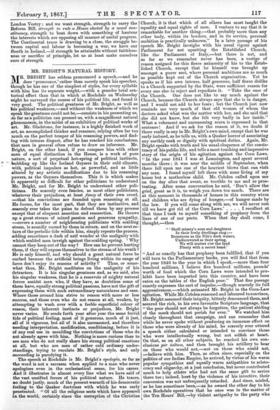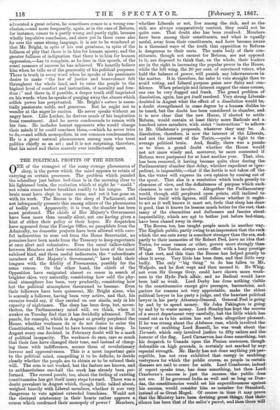MR. BRIGHT'S NATURAL HISTORY.
MR. BRIGHT has seldom pronounced a speech,—and he does pronounce,' rather than merely speak his speeches, though he has one of the simplest of styles, for every syllable with him has its separate weight,--with a grander total ora- torical effect than that in which at Rochdale on Wednesday alight he surveyed the course of his political life, and found it very good. The political greatness of Mr. Bright, as well as his political weakness,—and without the weakness of which we speak the greatness could not be,—consists in his presenting us, So far as a politician can present us, with a magnificent natural phenomenon, in the midst of an exhibition of political works of art. Mr. Gladstone, for instance, is a highly finished work of art, an accomplished thinker and reasoner, relying often far too much on the perfect temper of his reasoning powers, and find- ing with intense disgust, after he has reached his conclusions, that men in general often refuse to draw an inference. Mr. Bright, on the other hand, if you compare him with other anon of equal distinction in the House, is a work of pure nature, a sort of perpetual hot-spring of political instincts,
' bubbling up like the Iceland Geysers in their cold climate, with political impulses as hot, as powerful, and as little altered by any artistic modifications due to his reasoning powers, as the Geysers themselves. This it is which makes it apparently so difficult for other politicians to understand Mr. Bright, and for Mr. Bright to understand other poli- ticians. He scarcely even fancies, as most other politicians, whatever their prejudices, at least fancy of their own creed, —that his convictions are founded upon reasoning at all. He knows, for the most part, that they are instinctive, and scarcely ever takes the pains to defend them by any process except that of eloquent assertion and reassertion. He throws up a great stream of mixed passion and generous sympathy, —covers a number of neighbouring politicians with scalding steam, is soundly cursed by them in return, and on the next re- turn of the periodic tide within him, simply repeats the process, adding sometimes a dash of naïf wonder at the malignity with which scalded men inveigh against the scalding spring. Why cannot they keep out of the way ? How can he prevent hurting them, if they will expose themselves to the stream of his wrath ? He is only himself, and why should a great natural force be curbed because the artificial beings living within its range of
force don't enjoy its seasons of activity ?' Thus, or some- what thus, Mr. Bright meditates on the malignity of his detractors. It is his singular greatness and, as we said, also his singular weakness, that he is a reservoir of mighty natural forces amidst men who, if they have, as doubtless some of them have, equally strong political passions, have not the gift of expressing them with such extraordinary naturalness and ease. Where those around him strive to reason with more or less success, and those even who do not reason at all, weaken, by attempting to wash over with a feeble superficial colour of reason, their inherent instincts or prejudices, Mr. Bright never varies. He sends forth year after year the same fervid tide of political feeling, most of it generous, much of it just, all of it vigorous, but all of it also unreasoned, and therefore needing interpretation, modification, conditioning, before it is of any real use in moulding the convictions of those who do not already agree with him. Nothing is more curious than to see men who do not really share his strong political emotions at all, but who are men of rather cold ordinary under- standings, trying to emulate Mr. Bright's style, and only succeeding in parodying it.
The speech at Rochdale is Mr. Bright's apologia, so far as the word is not a sarcasm when applied to a man who never apologizes even in the ecclesiastical sense, for his career. And it illustrates in almost every line what we have said of the vast nnsifted forces of his political nature. He traces, so doubt justly, much of the present warmth of his democratic feeling to the Quaker doctrines with which he was early penetrated. " Of all the religious sects which have appeared in the world, certainly since the corruption of the Christian Church, it is that which of all others has most taught the equality and equal rights of men. I venture to say that it is remarkable for another thing,—that probably more than any other body, within its borders, and in its service, personal ambition is practically unknown." In a later passage of his speech Mr. Bright inveighs with his usual vigour against Parliament for not upsetting the Established Church, like the Parliament of Italy,—but there is not, and as far as we remember never has been, a vestige of reason assigned for this fierce animosity of his to the Estab- lished Church, except that he himself was brought up amongst a purer sect, where personal ambitions are as much as possible kept out of the Church organization. Yet he speaks as if his own intense, half generous, half fierce dislike to a Church supported by the State, were sufficient reason for every one else to reject and repudiate it. " Take the case of the Church. One does not like to say much against the Church, because the Church always says that she is in danger, and I would not add to her fears ; but the Church just now reminds me very much of that old woman of whom the doctors asked what was the matter with her, and she said that she did not know, but she felt very badly in her inside." What a vehement and unreasoning scorn is expressed in that sentence ! And if we ask for the reason of it, we doubt if there really is any in Mr. Bright's own mind, except that he was early imbued, as he tells us, with a Quaker horror of associating any earthly rank or dignity with spiritual duties. Again, Mr. Bright speaks with truth and his usual eloquence of the consis- tency of his public life, and tells a most touching and impressive story of the origin of his agitation against the Corn Laws. " In the year 1841 I was at Leamington, and spent several months there ; it was near the middle of September, when there fell upon me one of the heaviest blows that can visit any man. I found myself left there with none living of my house but a motherless child. Mr. Cobden called upon me on the day after that event, so terrible to me and so pros- trating. After some conversation he said, Don't allow the grief, great as it is, to weigh you down too much. There are at this moment in thousands of homes in this country wives and children who are dying of hunger,—of hunger made by the law. If you will come along with me, we will never rest till we have got rid of the Corn Laws.' . . . . I recollect at that time I took to myself something of prophecy from the lines of one of our poets. When that day shall come, I thought,—then
" Shall misery's sons and daughters In their lowly dwellings sing;— Bounteous as the Nile's dark waters, Undiscovered as their spring, We will scatter o'er the land Plenty with a secret hand.'
" And so exactly has that prophecy been fulfilled, that if you will turn to the Parliamentary books, you will find that from the year 1846 to the year in which I speak,—more than four hundred millions, I believe five hundred millions, pounds' worth of food which the Corn Laws were intended to pro- hibit have been imported into this country, and have been eaten on the tables of the English poor." That fine passage exactly expresses the sort of impulse,—though scarcely its full aggressiveness,—which animated Mr. Bright in the Corn-Law agitation. While Mr. Cobden reasoned and laboured to convince, Mr. Bright assumed their iniquity, bitterly denounced them, and assured the rich, in his own favourite Scripture language, that " the poor should not always be forgotten, the patient abiding of the meek should not perish for ever." We watched him closely throughout that campaign, and can remember that while he never spoke without producing an immense effect on those who were already of his mind, he scarcely ever uttered a speech either, calculated or intended to convince those who were intellectually wrong, but not selfish at heart. On that, as on all other subjects, he reached his own con- clusions per saltunt, and then brought his artillery to bear on those who would not, —not on those who could not, —believe with him. Then, as often since, especially on the politics of our Indian Empire, he arrived, by virtue of his warm popular sympathies and equally warm antipathies to aristo- cracy and oligarchy, at a just conclusion, but never contributed much to help others who had not the same gift to arrive there too ; indeed, hurt by the violence of his invective, their conversion was not unfrequently retarded. And since, misled,
as he has sometimes been,—as he owned the other day to his own Rochdale operatives that he once was in the matter of the Ten Hours' Bill,—by violent antipathy to the party who advocated a great reform, he sometimes comes to a wrong con- clusion,—and more frequently, again, as in the case of Reform, for instance, comes to a partly wrong and partly right, because wholly impulsive conclusion, and since yet in these cases also he uses the same strong language, it is not to be wondered at that Mr. Bright, in spite of his real greatness, in spite of the fullness of pity that there is in him for human misery, and the greater fullness of indignation that there is in him for human oppression,—has to complain, as he does in this speech, of the scant measure of success he has achieved. We heartily believe him when he tells us of the generosity of his political purposes. There is truth in every word when he speaks of his passionate desire to make " the law of justice and benevolence felt throughout the whole land, and to raise the people to the highest level of comfort and instruction, of morality and free- dom ;" and there is, if possible, a deeper truth still imprinted on his words, when he speaks of purging away the abuses which selfish power has perpetuated. Mr. Bright's nature is essen- tially passionate, noble, and generous. But he ought not to wonder at the anger he excites. He never speaks without an angry brow. Like Luther, he derives much of his inspiration from resentment. And he never condescends to reason with his foes. He includes honest opponents who would change their minds if he could convince them,—which he never tries to do,—and selfish monopolists, in one common condemnation. He is a great natural phenomenon among men who treat politics chiefly as an art ; and it is not surprising, therefore, that his mind and theirs scarcely ever intellectually meet.



































 Previous page
Previous page